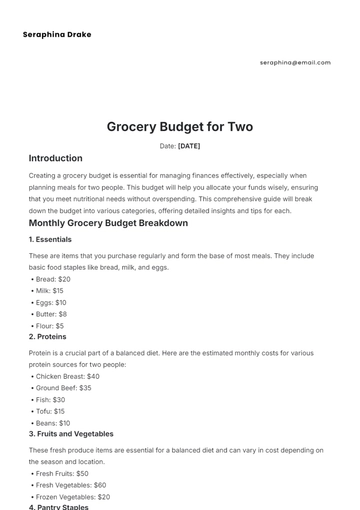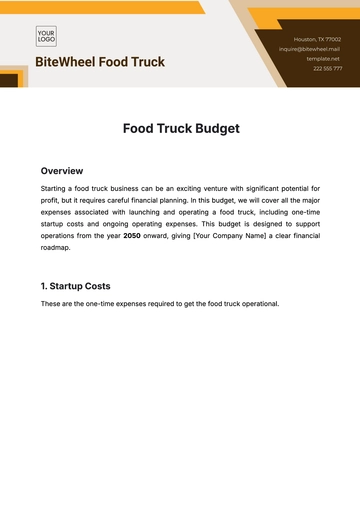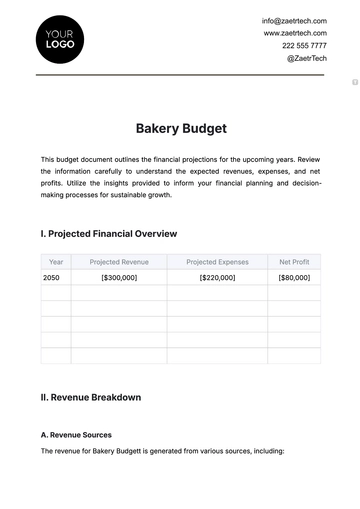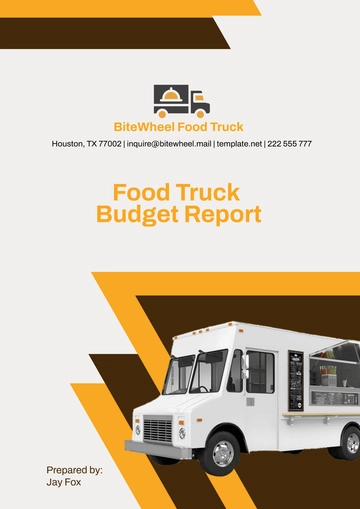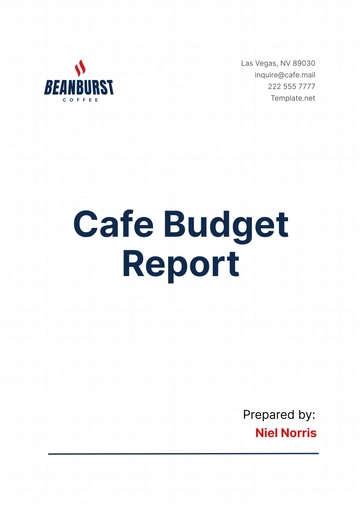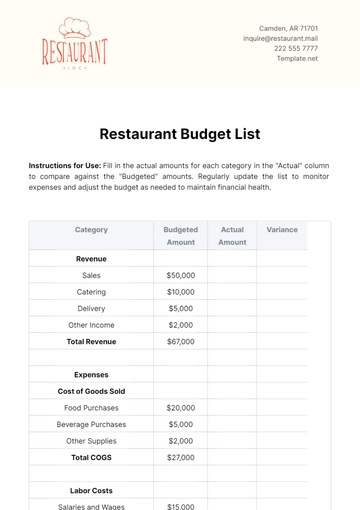Free Food Truck Budget Report
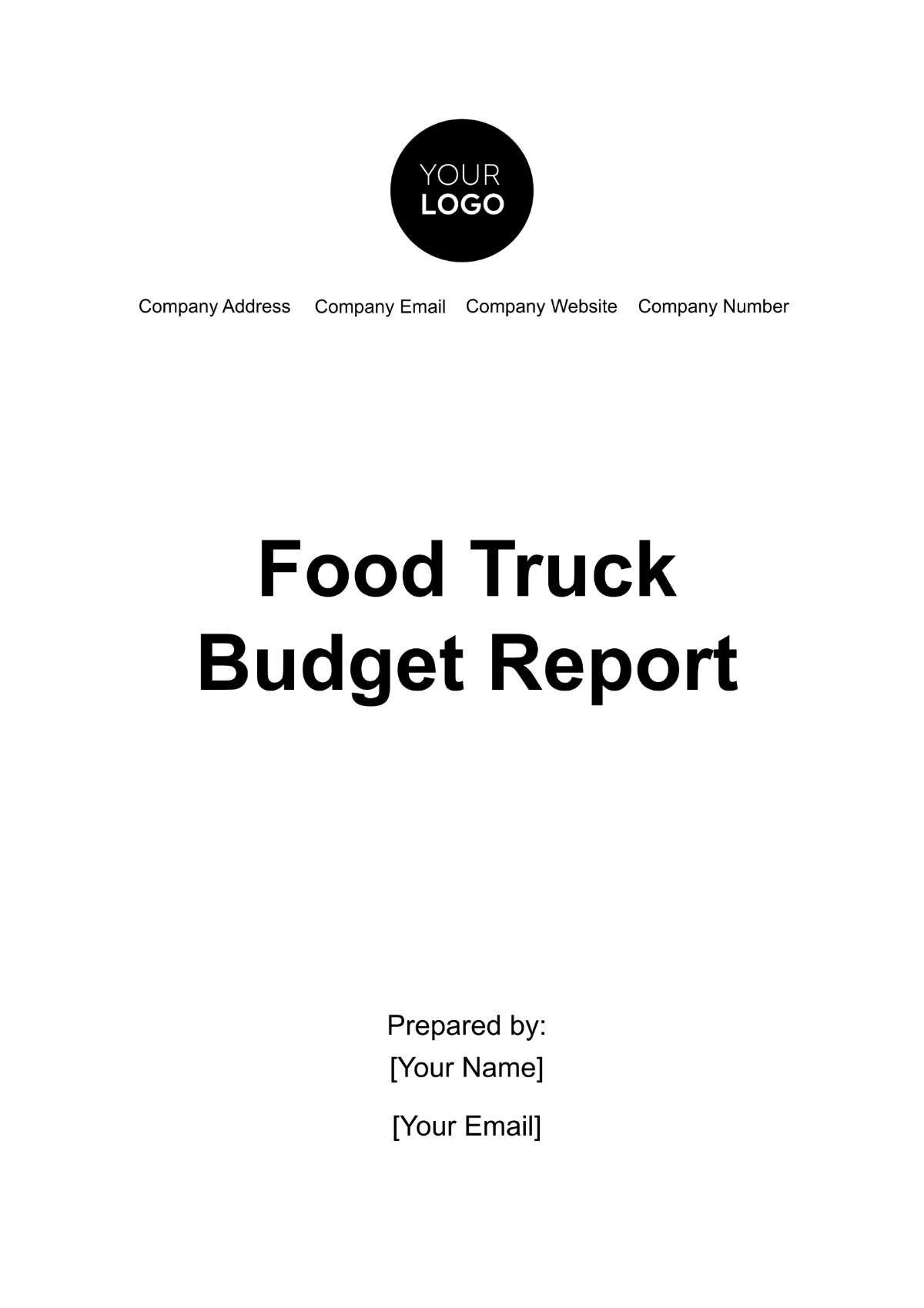
I. Introduction
Launching a food truck business is an exciting venture that not only offers culinary creativity but also the flexibility to reach diverse markets. However, the road to success is paved with careful financial planning and budgeting. This report outlines a comprehensive budget plan for [Your Company Name], focusing on the essential components that contribute to a successful food truck operation. Understanding startup costs, ongoing operating expenses, and potential revenues is crucial for creating a sustainable business model.
Accurate budgeting plays a pivotal role in managing finances effectively, enabling [Your Company Name] to navigate the competitive food truck landscape. By identifying key areas of investment such as equipment, permits, staffing, and marketing, this report aims to provide a clear roadmap for financial planning. Moreover, analyzing projected revenues against estimated expenses will help [Your Company Name] assess its profitability and make informed decisions. Ultimately, this comprehensive budget plan will serve as a strategic tool to guide [Your Company Name] toward a thriving food truck business, ensuring that it not only survives but flourishes in the dynamic food service industry.
II. Startup Costs
Startup costs are the initial expenses incurred to get the food truck business up and running. These include the purchase of the food truck, equipment, permits, and initial inventory.
1. Food Truck Acquisition
The first significant investment is acquiring the food truck itself. The cost can vary depending on whether the truck is new or used and the level of customization required.
Item | Cost ($) |
|---|---|
New Food Truck | 80,000 |
Used Food Truck | 40,000 |
Customization | 10,000 |
2. Equipment and Supplies
Equipping the food truck with the necessary kitchen appliances and supplies is crucial. This includes items such as grills, refrigerators, and utensils.
Grill | $2,000 |
Refrigerator | $1,500 |
Utensils | $500 |
3. Permits and Licenses
Obtaining the necessary permits and licenses is essential for legal operation. Costs can vary based on location and regulatory requirements.
Health Permit | $300 |
Business License | $200 |
Parking Permit | $100 |
4. Initial Inventory
Stocking the food truck with initial inventory is crucial for starting operations. This includes ingredients, packaging, and other consumables.
Ingredients | $1,000 |
Packaging | $500 |
III. Operating Expenses
Operating expenses are the ongoing costs required to run the food truck business on a daily basis. These include fuel, labor, and maintenance costs.
1. Fuel
Fuel is a significant recurring expense for a mobile food truck. The cost will depend on the operational schedule and fuel prices.
Estimated monthly fuel cost | $600 |
|---|
2. Labor
Labor costs include wages for employees who assist in food preparation, service, and cleaning.
Role | Monthly Salary ($) |
|---|---|
Cook | 2,500 |
Server | 2,000 |
3. Maintenance and Repairs
Regular maintenance and occasional repairs are necessary to keep the food truck operational and compliant with health and safety standards.
Estimated monthly maintenance cost | $300 |
|---|
IV. Revenue Projections
To ensure the viability of the food truck business, it is essential to forecast potential revenues. This section outlines estimated daily sales and monthly revenue projections.
1. Daily Sales
Estimating daily sales involves projecting average sales per day based on foot traffic, location, and menu pricing.
Estimated average daily sales | $1,500 |
|---|
2. Monthly Revenue
Using the daily sales estimate, monthly revenue can be calculated by multiplying daily sales by the number of operating days per month.
Estimated monthly revenue = $1,500 x 25 days = $37,500 |
|---|
V. Conclusion
A comprehensive budget is vital for the success of any food truck business, including [Your Company Name]. This report has outlined the key areas of startup costs, operating expenses, and revenue projections, which are essential components for establishing a solid financial foundation. By understanding these elements, [Your Company Name] can identify necessary investments and anticipate future financial needs, thereby minimizing the risk of unexpected expenses. This proactive approach to financial planning is crucial in navigating the complexities of the food truck industry.
Moreover, proper financial planning ensures that the food truck operates smoothly and achieves profitability. By adhering to this budget plan, prospective food truck owners, including [Your Company Name], can effectively manage their finances and enhance their chances of business success. Regularly reviewing and adjusting the budget as the business evolves will allow [Your Company Name] to respond to market changes, customer preferences, and operational challenges. Ultimately, a well-structured budget not only serves as a roadmap for daily operations but also as a strategic tool for long-term growth and sustainability in the competitive food truck landscape.
- 100% Customizable, free editor
- Access 1 Million+ Templates, photo’s & graphics
- Download or share as a template
- Click and replace photos, graphics, text, backgrounds
- Resize, crop, AI write & more
- Access advanced editor
Manage your finances effectively with the Food Truck Budget Report Template from Template.net. This editable and customizable document helps you track expenses, income, and financial projections. Fully editable in our Ai Editor Tool, it ensures accurate budget management for your food truck business.
You may also like
- Budget Sheet
- Personal Budget
- Non Profit Budget
- Monthly Budget
- Project Budget
- HR Budget
- Company Budget
- Home Budget
- Weekly Budget
- College Budget
- Business Budget
- Construction Budget
- Small Business Budget
- Hotel Budget
- Annual Budget
- Home Renovation Budget
- Household Budget
- Student Budget
- Grocery Budget
- Marketing Budget
- Corporate Budget
- Startup Budget
- Manufacturing Budget
- Church Budget
- University Budget
- Annual Budget Plan
- Event Budget
- Operating Budget
- Travel Budget
- Food Budget
- IT and Software Budget
- School Budget
- Real Estate Budget
- Sales Budget
- Conference Budget
- Budget Finance
- Freelancer Budget
- Budget Advertising
